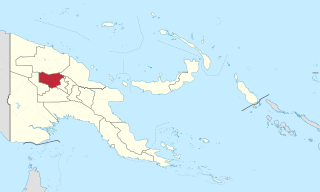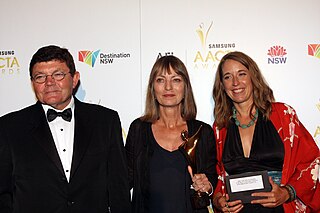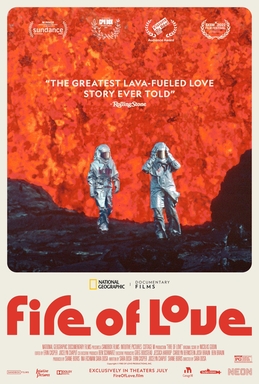Related Research Articles
Mark Little is an Australian actor, television presenter, comedian and screen/stage writer. He is known for portraying the role of Joe Mangel from 1988 to 1991, 2005 and 2022 on the Australian soap opera Neighbours.

Enga is one of the provinces in Papua New Guinea (PNG). Enga is geographically situated in the northern region of Papua New Guinea and was separated from the adjacent Western Highlands at the time of national independence in 1975. The majority ethnic group are Engans. Approximately 500,000 people live within the province, which has one spoken language in all five of its districts. A small minority of Engans' land on the eastern side of the region remained in the Western Highlands, their territory being accessible by road from Mount Hagen but not directly from elsewhere in Enga territory.

Mount Hagen is the third largest city in Papua New Guinea, with a population of 46,250. It is the capital of the Western Highlands Province and is located in the large fertile Wahgi Valley in central mainland Papua New Guinea, at an elevation of 1,677 m (5,502 ft).

Dennis O'Rourke was an Australian cinematographer and documentary filmmaker.
First Contact is a 1983 Australian documentary film by Bob Connolly and Robin Anderson which recounts the incursion of gold-prospecting Australians into the unexplored interior highlands of New Guinea in 1930, then inhabited by a prosperous native population numbering in the region of one million. It is based on the book of the same name by the same authors. Inhabitants of the region and surviving members of the Leahy brothers' gold prospecting party recount their astonishment at this unforeseen meeting. The film includes both moving and still pictures taken by Michael Leahy, leader of the party, and contemporary footage of the island's terrain.
Michael James LeahyMBE was an Australian explorer and gold prospector, famed for his exploration of the Highlands area of Papua New Guinea. He photographed, filmed and published many of his explorations widely.
Melpa is a Papuan language spoken by about 130,000 people predominantly in Mount Hagen and the surrounding district of Western Highlands Province, Papua New Guinea.
Joyce Chopra is an American director.

Benny Wenda is a West Papuan independence leader and Chairman of the United Liberation Movement for West Papua (ULMWP). He is an international lobbyist for the independence of West Papua from Indonesia. He lives in exile in the United Kingdom. In 2003 he was granted political asylum by the British government following his escape from custody while on trial.
Sydney Film School is a private film school based in Waterloo, a suburb of Sydney, Australia. Originally founded in 2004 by industry professionals and film lecturers from the University of Sydney, in 2019 the school changed ownership as part of an amalgamation with the Sydney Acting School.

The Sundance Film Festival is an annual film festival organized by the Sundance Institute. It is the largest independent film festival in the United States, with more than 46,660 attending in 2016. The festival takes place every January in Park City, Utah; Salt Lake City, Utah; and at the Sundance Resort, and acts as a showcase for new work from American and international independent filmmakers. The festival consists of competitive sections for American and international dramatic and documentary films, both feature films and short films, and a group of out-of-competition sections, including NEXT, New Frontier, Spotlight, Midnight, Sundance Kids, From the Collection, Premieres, and Documentary Premieres. Many films premiering at Sundance have gone on to be nominated and win Oscars such as Best Picture, Best Director and Best Actor in a Leading Role.

Amiel Courtin-Wilson is an Australian filmmaker. He has directed over 20 short films and several feature films. His debut feature film, Hail, premiered internationally at Venice Film Festival in 2011. He is also a musician, music producer, and visual artist.

Andrew Pike is an Australian film historian, film distributor and exhibitor, and documentary producer and director. Pike formed Ronin Films, an Australian film distribution company, with his first wife, Dr Merrilyn Fitzpatrick, in 1974. With Ross Cooper, he co-authored the book, Reference Guide to Australian Films 1906–1969 and has produced and directed many documentaries since 1982. Pike has been honoured with numerous awards including a plaque on the ACT Honour Walk in Canberra City, appointed of the Order of Australia (OAM) and an Honorary Doctorate from the University of Canberra.

Bob Connolly is an Australian film director, cinematographer and author. He is best known for his documentaries produced over the past 30 years, including The Highlands Trilogy and Rats in the Ranks. More recent films include Facing the Music (2001) and Mrs Carey's Concert (2011). His films have won an Academy Award nomination, AFI Awards, and Grand Prix at the Cinéma du Réel Festival.
Robin Anderson was an Australian award-winning documentary filmmaker.
Marina Zenovich is an American filmmaker known for her biographical documentaries. Her films include LANCE, Robin Williams: Come Inside My Mind, Richard Pryor: Omit the Logic and Roman Polanski: Wanted and Desired, which won two Emmy awards.
Garrett Bradley is an American filmmaker and director of short films, feature films, documentaries, and television. She is known for blending cinematic genres to explore the larger sociopolitical significance of the everyday moments of her subjects' lived experience.

Fire of Love is a 2022 independent documentary film about the lives and careers of volcanologists Katia and Maurice Krafft. Directed, written, and produced by Sara Dosa, the film had its world premiere at the 2022 Sundance Film Festival on January 20, 2022, where it won the Jonathan Oppenheim Editing Award. It was released on July 6, 2022, by National Geographic Documentary Films and Neon. It received acclaim from critics, and was nominated for Best Documentary Feature at the 95th Academy Awards.
Joe Leahy's Neighbours is a 1989 Australian documentary film, created by Robin Anderson and Bob Connolly, looking at Papua New Guinean business man Joe Leahy and relationship to those around him. It is some ways a sequel to First Contact.
References
- ↑ "The Screen Guide - Black Harvest". Screen Australia. Retrieved 22 October 2017.
- ↑ Holden, Stephen (4 April 1992). "Review/Film Festival; Doing Business in Papua New Guinea". The New York Times. Retrieved 22 October 2017.
- ↑ "Black Harvest - Principal Credits". Australian Screen Online. Retrieved 22 October 2017.
- ↑ "Black Harvest (1992)". Australian Screen Online. Retrieved 22 October 2017.
- ↑ Baranowska, Carmela. "The reality and the documentary". Real Time Arts. Retrieved 22 October 2017.
- ↑ Connolly, Bob (13 September 2016). "Bob Connolly returns to PNG Highlands after 25 years". ABC News. Retrieved 22 October 2017.
- ↑ Rule, Shiela (3 October 1992). "Filming a Tribe and Surviving a War". The New York Times. Retrieved 22 October 2017.
- ↑ Schwartz, Larry (1 September 2005). "Harvest of memories". The Age. Retrieved 22 October 2017.
- ↑ "Black Harvest - Curator's Notes". Australian Screen Online. Retrieved 22 October 2017.
- ↑ McCarthy, Todd (17 August 1993). "Sundance glow no promise of box office sizzle". Variety. Retrieved 23 October 2017.
- ↑ Stratton, David (16 April 2002). "Robin Anderson". Variety. Retrieved 23 October 2017.
- ↑ "Film series: Papua New Guinea stories". Art Gallery NSW. Retrieved 22 October 2017.
- ↑ "DER Documentary - Black Harvest". Documentary Educational Resource. Retrieved 22 October 2017.